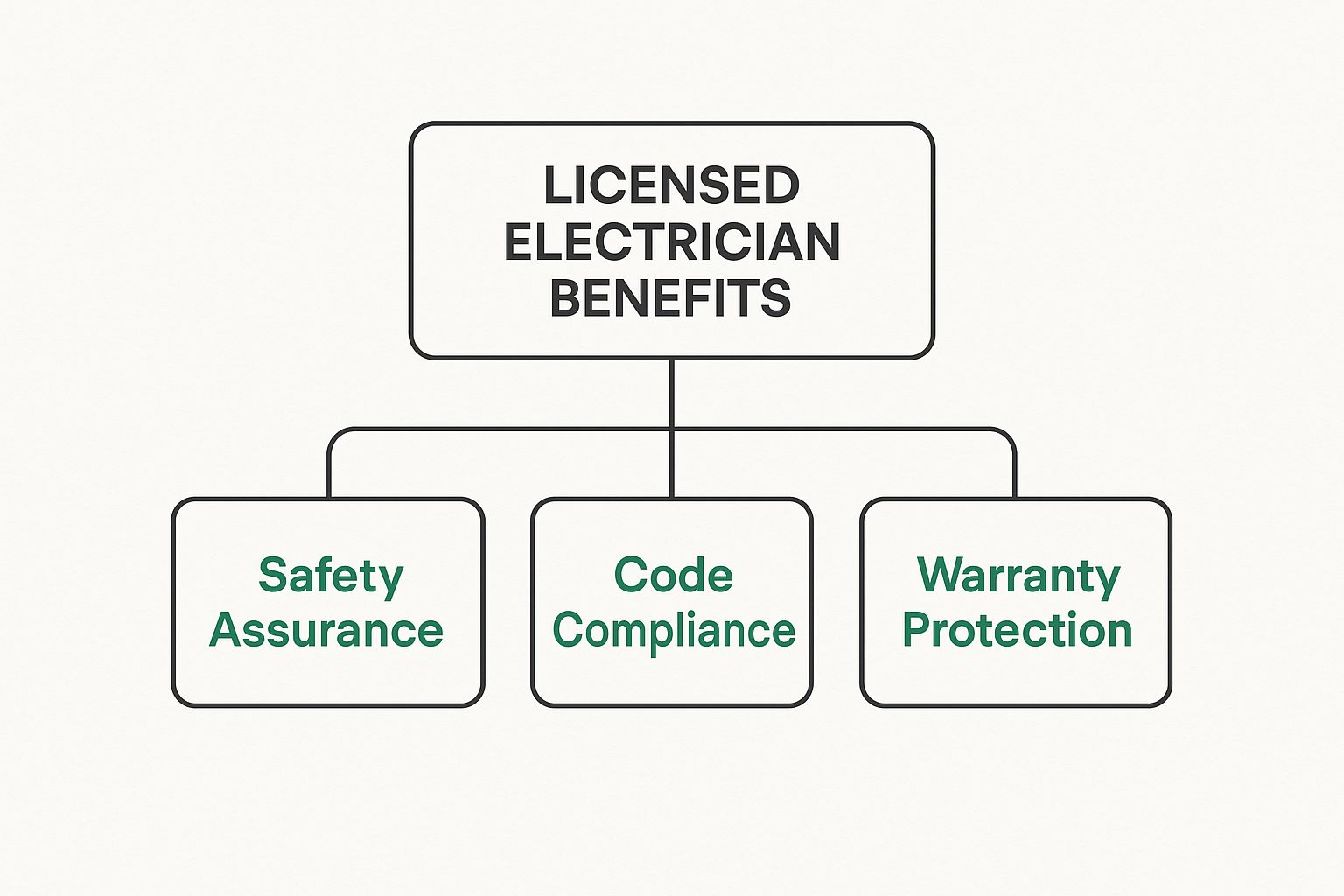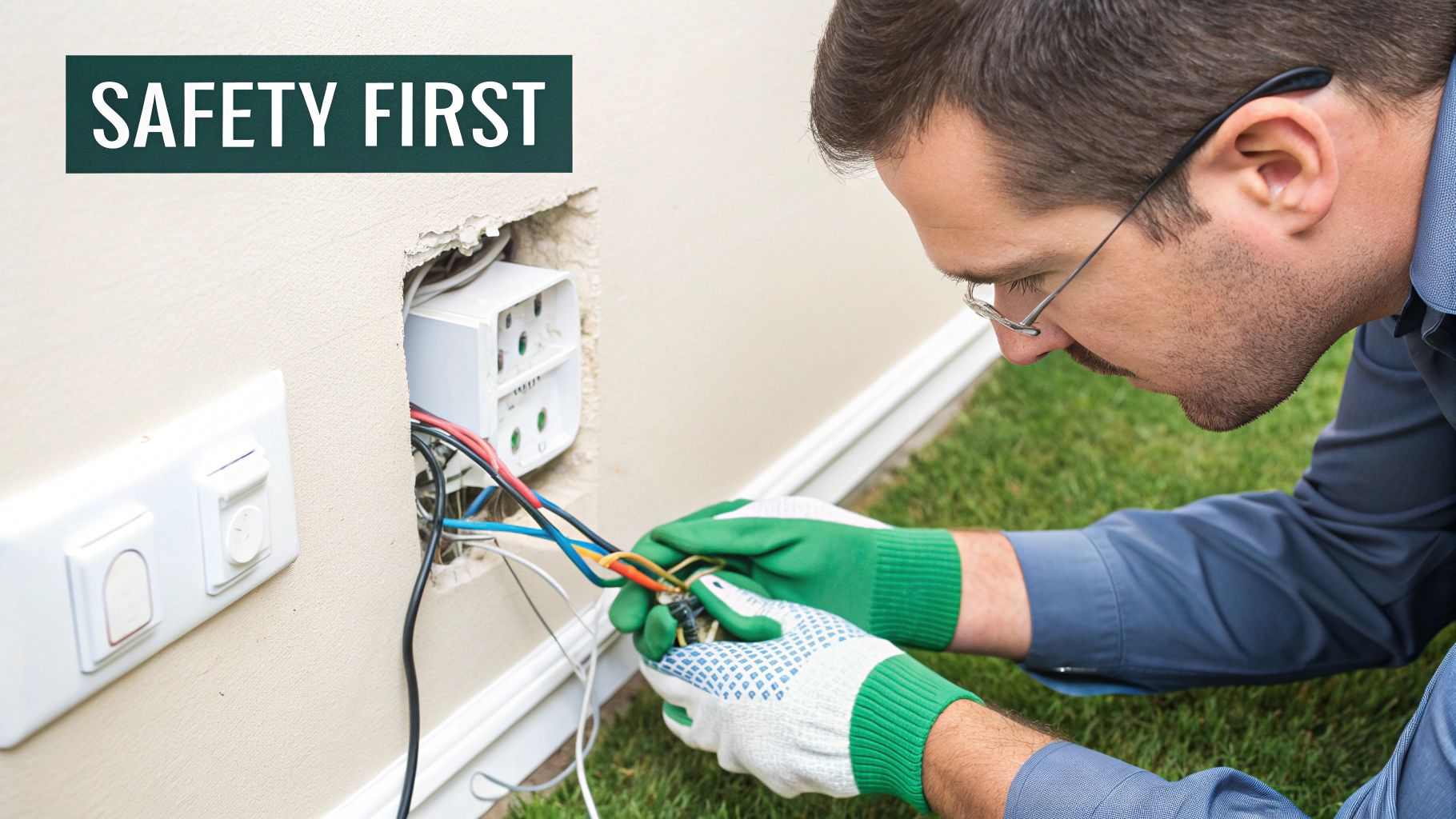- Quick Answer: Yes. For nearly any electrical work in Washington state beyond changing a lightbulb, you legally need a licensed electrician. This is required by state law to ensure the work is safe, up to code, and properly permitted.
- Key Takeaways:
- Washington Law is Strict: Installing a new outlet, running a circuit, or upgrading your electrical panel all require a licensed electrician and an official permit from the Department of Labor & Industries (L&I).
- DIY is Highly Restricted: While a very narrow homeowner exemption exists for your primary residence, you still must pull a permit and pass a state inspection. The work must be 100% code-compliant.
- Safety & Insurance are Paramount: Hiring a licensed professional is the best way to prevent electrical fires and shock hazards. It also ensures your homeowner’s insurance policy remains valid.
- Verification is Easy: You can and should verify any electrician’s license, bond, and insurance using the Washington State L&I “Verify a Contractor” online tool before hiring them.
When something goes wrong with your home’s electricity, it’s natural to wonder, “Do I really need to call a licensed electrician?” Here in Washington state, the answer is a firm yes for almost everything. If the job is more complicated than swapping out a lightbulb, state law says you need a pro. This isn’t just red tape—it’s about making sure the work is safe, meets legal codes, and is properly documented.
Your Quick Guide to Hiring an Electrician
Think of it this way: you wouldn’t let an amateur surgeon operate on you, right? The same logic applies to the complex (and potentially dangerous) electrical system powering your home. Washington’s regulations are there for a very good reason: to prevent fires, electric shock, and other serious hazards.
We get calls about this all the time. People want to do the right thing but aren’t always sure what that is. Here are the most important things to remember:
- It’s the Law: From installing a new outlet to upgrading your entire electrical panel, Washington requires a licensed electrician and a permit for the job.
- DIY Is Very Limited: The list of electrical tasks you can legally do yourself is incredibly short. Even then, you’ll likely need a state inspection to ensure it’s safe and won’t void your home insurance.
- Safety & Insurance: Hiring a licensed electrician is your best defense against fire risks and shock. It also ensures your insurance company can’t deny a future claim because of unpermitted, non-compliant work.
- Easy to Verify: Don’t just take their word for it. You can quickly check if an electrician is legitimate using the Washington State L&I’s “Verify a Contractor” tool online.
To put it simply, the choice between a professional and a DIY attempt has major consequences.
Licensed Electrician vs. DIY: A Quick Comparison
This table breaks down the key differences in safety, legality, and outcomes between hiring a professional and attempting electrical work yourself in Washington state.
| Factor | Licensed Electrician | DIY Electrical Work |
|---|---|---|
| Safety | Trained to prevent shock, shorts, and fire hazards. Work is insured. | High risk of dangerous mistakes. No liability protection. |
| Legality | Work is permitted, inspected, and fully compliant with Washington state and local codes. | Unpermitted work is illegal and can lead to fines. |
| Insurance | Protects your homeowner’s insurance policy. | Can void your insurance, leaving you liable for damages. |
| Resale Value | Professional, documented work adds value and passes home inspections. | Unpermitted work must be disclosed and can kill a home sale. |
| Quality | Guaranteed to work correctly and last for years. | No guarantee of quality, often leading to future repairs. |
The takeaway is clear: while saving a few dollars with DIY might seem tempting, the potential costs—from safety risks to legal trouble—just aren’t worth it.

As you can see, every benefit—from safety to long-term value—is tied directly to a professional’s verified training and credentials.
For more practical tips on home electrical projects and safety, check out the resources on our blog.
The Real Dangers of Unlicensed Electrical Work

Trying to save a few bucks by hiring an unlicensed person for electrical work is a massive gamble, and your home’s safety is what’s on the line. These aren’t just vague warnings; they are very real dangers that can have devastating consequences for your property and, more importantly, your family.
Here at Phase 3 Electric, we’ve been called in to fix countless jobs that started as a small shortcut and ended in a major disaster. The scariest risks, like faulty connections and improper wiring, create silent fire hazards ticking away behind your walls. All it takes is one undersized wire or a loose connection in an outlet to overheat, spark, and ignite the wood and insulation around it.
Beyond the risk of fire, there’s the immediate danger of life-threatening electrical shock. A properly trained, licensed electrician knows the ins and outs of grounding, bonding, and how to make absolutely sure a circuit is de-energized before they touch it. An amateur, on the other hand, might easily leave wires live and exposed, turning your appliances and fixtures into lethal traps for anyone who comes into contact with them.
Financial and Insurance Nightmares
The financial fallout is a danger that catches most people completely by surprise. Let’s walk through a common scenario: you hire a cheap, unlicensed handyman to install some new lighting. Everything seems fine for a few months, but then a wire shorts out in the attic and sparks a fire, causing major damage.
When the insurance adjuster investigates, they find the electrical work was done without a Washington state permit and doesn’t meet safety codes. What happens next? Your claim is denied. You’re left holding the bill for tens of thousands of dollars in fire and smoke damage repairs, all on your own dime.
The rigorous training a licensed electrician goes through is all about preventing these kinds of tragedies. Sadly, 33% of all occupational electrical fatalities between 2011 and 2023 happened in private homes, a sobering statistic that highlights the dangers lurking in any home’s electrical system. You can see more data on this from the IAEI Magazine’s report on workplace injuries.
This is why asking, “do I need a licensed electrician?” is about so much more than just ticking a box. It’s about taking the single most important step to protect your home, your family, and your financial well-being from a completely preventable catastrophe.
Navigating Washington State’s Electrical Laws
When it comes to electrical work in Washington, the laws can feel a bit tangled. But every single rule is there for one reason: to keep you and your family safe. That’s why the answer to “Do I need a licensed electrician?” is almost always a firm “yes.”
In Washington, nearly all electrical projects require a permit and an inspection from the Department of Labor & Industries (L&I). This isn’t just for massive renovations. We’re talking about common jobs like adding a new outlet, installing a dedicated circuit for your new EV charger, or running power out to a shed. This process makes sure every wire and connection meets the strict safety standards of the National Electrical Code (NEC), which is the law of the land here.
The Limited Homeowner Exemption
Now, you might have heard about Washington’s “homeowner exemption,” and it’s easy to mistake it for a free pass to do your own electrical work. In reality, the rule is extremely narrow and comes with some serious strings attached.
This exemption lets you perform electrical work only on the primary residence you both own and live in. It’s not for rental properties, your business, or a house you’re getting ready to flip. Even if you qualify to do the work yourself under this rule, you are still legally required to:
- Pull an electrical permit before you start the project.
- Follow all current electrical codes to the letter.
- Arrange for and pass an L&I inspection when you’re finished.
The L&I inspector isn’t there to guide you or teach you on the job. Their role is to verify the work is safe and up to code. If it fails, you’ll have to fix every mistake and pay for another inspection, which means more money and more delays.
Think of these laws less as a hassle and more as a safety net. Hiring a professional from a trusted company like Phase3Electric ensures the job is done correctly and safely the first time. It’s the best way to keep your home compliant, insurable, and—most importantly—safe.
Common Projects That Always Require a Pro

So, when does a project get too big for a handy homeowner to tackle? Knowing where to draw the line between a quick DIY fix and a job that needs a licensed electrician is absolutely essential for your safety and your home’s integrity. Some upgrades, because of their complexity and the high stakes involved, should always be left to a professional.
Think of your home’s electrical system like its circulatory system. Adding a major appliance like an EV charger or a hot tub is like asking that system to support a whole new organ. A licensed electrician doesn’t just connect a few wires. They perform a critical load calculation to make sure your electrical panel can handle the massive, continuous power draw without overloading circuits and creating a serious fire hazard.
This same logic applies to other big projects that many Washington homeowners consider.
Upgrades That Need a Professional Touch
It’s not just about flashy new installations. Even what seems like a simple change can have major safety consequences if you don’t know exactly what you’re doing. The following jobs always fall squarely into the “call a pro” category:
- Electrical Panel Upgrades: This is the electrical equivalent of open-heart surgery for your home. Your main service panel is the central hub for all your power, and any work on it absolutely must be done by a licensed professional in Washington.
- Running New Circuits: Whether you’re adding on to your home, installing a heavy-duty appliance, or setting up a workshop, running a new circuit means working directly with the panel. It requires ensuring the new wiring is the correct size and has the right protection.
- Relocating Outlets and Switches: Moving an outlet might seem like a small cosmetic change, but it’s more involved than it looks. It means cutting into walls, modifying existing wiring, and ensuring every connection is secure and up to code.
These tasks aren’t just complicated; they carry real risks. Historical data reveals that 63% of electrical fatalities happened during construction or repair work, which just goes to show how dangerous hands-on electrical work can be.
Any project that involves adding new circuits, messing with your panel, or installing high-demand appliances is a clear sign to call a licensed electrician. For bigger jobs, knowing the requirements for both residential and commercial electrical services can offer some great perspective. This isn’t just about following the rules—it’s about making sure the job is done safely, reliably, and won’t cause you headaches down the road.
How to Verify an Electrician’s License in Washington
Hiring an electrician shouldn’t be a shot in the dark. Thankfully, Washington State makes it incredibly easy to see if the person you’re considering is legitimate, insured, and accountable before they ever touch a wire in your home. This quick check is your most powerful first step.
Your best friend here is the Washington State Department of Labor & Industries (L&I) “Verify a Contractor” tool. It’s a free, public resource that gives you a direct look into a contractor’s history and status. All you need is their business name or license number to pull up their record.
What to Look For
When you run a search, you’re not just checking a box. You’re looking for three specific things that protect you and your home:
- An Active Electrical License: This is proof they’ve passed the state’s tough training and testing requirements. No license, no deal.
- A Current Bond: Think of this as your financial safety net. If the work is done poorly or left unfinished, the bond is there to help cover the cost of making it right.
- Proof of Insurance: This is non-negotiable. It protects you from being on the hook financially if a worker gets hurt or your property is damaged during the job.
Here’s what the L&I verification portal looks like. It’s a simple search that puts all the power in your hands.
This straightforward search page is your gateway to a contractor’s official records, providing total transparency.
Trust your gut when you see red flags. If a contractor gets cagey about giving you their license number, pushes for a cash-only deal, or tells you a permit “isn’t necessary” for a big job, walk away. These are classic moves by unqualified individuals trying to cut corners.
Taking a few minutes to verify credentials isn’t being difficult—it’s being a smart homeowner. It ensures you’re working with a real professional who is committed to safety and quality.
If you have questions or want to schedule work with a fully licensed and vetted team, you can request service from Phase3Electric right here.
The Hidden Costs of DIY Electrical Work

The idea of saving a few hundred dollars on an electrical project is always tempting. But when you’re weighing the cost, it’s easy to overlook the true, long-term price of going the DIY route. The question isn’t just about the upfront cost; it’s about protecting your biggest asset—your home.
Skipping a licensed professional can set off a chain reaction of problems. A seemingly simple mistake today can turn into faulty wiring that requires expensive, invasive repairs down the road. Even worse, one bad connection is all it takes to spark a devastating house fire. And if your insurance company finds out the work wasn’t done to code by a licensed electrician in Washington, they may refuse to cover the damage.
The immediate danger is just as real. Around the world, electrical accidents injure an estimated 1.2 million people annually. It’s a sobering statistic that highlights the real-world risks. If you want a closer look at the data, you can explore detailed electrical safety statistics to understand the full picture.
From Expense to Investment
Beyond the immediate safety risks, unpermitted electrical work can seriously hurt your home’s resale value. When it’s time to sell, that “weekend project” becomes a huge red flag for home inspectors and potential buyers, often scuttling the deal or forcing you to make costly, last-minute repairs.
This is why it helps to change your perspective.
Think of hiring a licensed electrician not as an expense, but as an essential investment in your home’s safety, its market value, and your family’s peace of mind.
That fee you pay an expert is a small price for knowing the job is done right, meets all legal codes, and is built to last. It’s an investment that protects your home from future disasters and ensures it remains a safe, valuable place for years to come.
Got questions about hiring an electrician? You’re not alone. It’s smart to ask before you let someone work on your home’s electrical system. Let’s clear up a couple of common questions we hear all the time from homeowners here in Washington.
What’s the Difference Between a Journey-Level and a Master Electrician?
Think of it like this: a journey-level electrician is a fully qualified, experienced pro. They’ve put in thousands of hours of hands-on training and passed a tough state exam. They are the experts you’ll call for almost any residential job in Washington, from upgrading your electrical panel to wiring a new addition or tackling a full home rewire.
A master electrician has done all that, and then some. They have even more years of experience under their belt and have passed another, higher-level exam. This qualifies them to take on the big stuff—designing and overseeing complex electrical systems for large commercial buildings or industrial sites.
The bottom line is that for your home, a licensed journey-level electrician has exactly the right expertise to get the job done safely and correctly. Both titles mean they are trained, tested, and legally recognized by Washington state.
Do I Really Need an Electrician Just to Replace a Light Fixture?
This one trips up a lot of DIY-savvy homeowners. On the surface, swapping out a light fixture seems simple enough. But here’s where it gets tricky: Washington law is clear that any project that alters fixed wiring requires a permit and a licensed professional.
So, if you’re doing a simple one-for-one swap and the wiring is in perfect shape, you might be in a gray area. The problem is, you often don’t know the state of the wiring until you get in there. If you have to modify anything—even a small connection—you’ve officially crossed into work that needs a permit in Washington.
Calling a professional guarantees the new connection is solid, the fixture is grounded correctly, and there are no hidden fire hazards lurking in your ceiling. When in doubt, the safest bet is always to call a pro.
When you need straight answers and electrical work you can count on, Phase3Electric is here to help. We’re the reliable local expert who actually answers the phone because, unlike corporate competitors, we combine technical mastery with genuine care for our community’s success. For any electrical project, big or small, reach out to us today.
